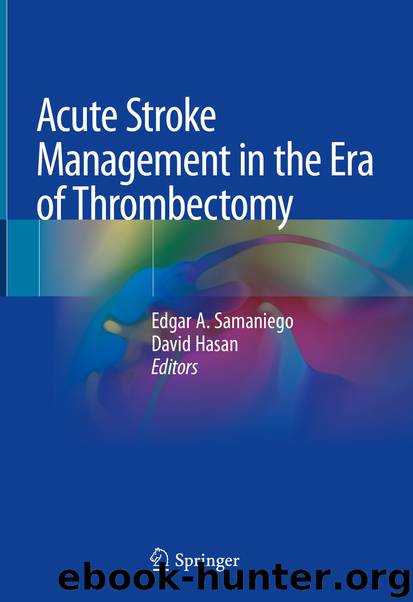Acute Stroke Management in the Era of Thrombectomy by Edgar A. Samaniego & David Hasan

Author:Edgar A. Samaniego & David Hasan
Language: eng
Format: epub
ISBN: 9783030175351
Publisher: Springer International Publishing
Highlight
According to recent evidence, the use of intracranial stenting for AIS may benefit selected patients after failed MT, particularly those presenting with underlying intracranial atherosclerotic disease. Further studies will allow better characterization of AIS patients suitable for intracranial stenting.
Extracranial Stenting in Acute Ischemic Stroke
Tandem occlusions (TO) involving the extracranial cervical carotid artery and an ipsilateral intracranial artery are a difficult treatment challenge. Most positive trials did not specifically evaluate patients presenting with concomitant stenosis or occlusion of the extracranial circulation. The two main culprits for tandem occlusions are (1) underlying severe carotid stenosis due to atherosclerosis or dissection leading to local thrombus formation and (2) subsequent intracranial artery-to-artery embolization. It is often debated whether the intra- or the extracranial lesion should be treated first. While most operators try to achieve recanalization with thrombectomy and angioplasty of the cervical lesion alone, in cases of severe underlying stenosis or refractory (re)occlusion, there may be a need for acute stenting of the proximal extracranial carotid artery. Although this situation only occurs in only a few percentages of all strokes, the outcomes may be less favorable than single occlusions, and IVT alone has poor efficacy (~9%) [30]. In addition, for patients who receive only angioplasty, the risk of reocclusion remains. For further information regarding the best approach and surgical technique to treat tandem occlusions, refer to Chap. 10.
A recent study reviewed 156 patients who had tandem occlusions, excluding those who had carotid artery dissection. Sixteen (10.3%) patients underwent emergent carotid stenting and of these patients, 10 also received intravenous thrombolysis. Successful recanalization was achieved in 93.8% of the patients. One patient (6.3%) experienced symptomatic intracranial hemorrhage (sICH), one patient had early in-stent thrombosis, and one patient developed cerebral hyperperfusion syndrome. At 3-month follow-up, 11 patients were independent (68.8%). One patient died during the initial hospitalization (6.3%) [31].
A recent meta-analysis included 33 studies and a total 1102 patients treated with tandem occlusions, and showed that nearly half of all tandem occlusion patients treated with MT had good neurological outcomes. The sICH rate was 8%. The majority of patients (n = 509) for which outcome data was available underwent stent placement at the time of the procedure, and 76 patients underwent angioplasty alone. No statistical difference was found in the outcomes for patients who were treated extracranially versus intracranially first (mRS ≤2 at 90 days, 53% vs 49%, p = 0.58) nor whether treated with stenting or angioplasty alone (49% vs 49%, p = 0.39) [32].
Download
This site does not store any files on its server. We only index and link to content provided by other sites. Please contact the content providers to delete copyright contents if any and email us, we'll remove relevant links or contents immediately.
| Anesthesiology | Colon & Rectal |
| General Surgery | Laparoscopic & Robotic |
| Neurosurgery | Ophthalmology |
| Oral & Maxillofacial | Orthopedics |
| Otolaryngology | Plastic |
| Thoracic & Vascular | Transplants |
| Trauma |
Periodization Training for Sports by Tudor Bompa(8253)
Why We Sleep: Unlocking the Power of Sleep and Dreams by Matthew Walker(6706)
Paper Towns by Green John(5178)
The Immortal Life of Henrietta Lacks by Rebecca Skloot(4576)
The Sports Rules Book by Human Kinetics(4379)
Dynamic Alignment Through Imagery by Eric Franklin(4208)
ACSM's Complete Guide to Fitness & Health by ACSM(4057)
Kaplan MCAT Organic Chemistry Review: Created for MCAT 2015 (Kaplan Test Prep) by Kaplan(4004)
Introduction to Kinesiology by Shirl J. Hoffman(3765)
Livewired by David Eagleman(3764)
The Death of the Heart by Elizabeth Bowen(3609)
The River of Consciousness by Oliver Sacks(3599)
Alchemy and Alchemists by C. J. S. Thompson(3515)
Bad Pharma by Ben Goldacre(3422)
Descartes' Error by Antonio Damasio(3270)
The Emperor of All Maladies: A Biography of Cancer by Siddhartha Mukherjee(3148)
The Gene: An Intimate History by Siddhartha Mukherjee(3094)
The Fate of Rome: Climate, Disease, and the End of an Empire (The Princeton History of the Ancient World) by Kyle Harper(3055)
Kaplan MCAT Behavioral Sciences Review: Created for MCAT 2015 (Kaplan Test Prep) by Kaplan(2983)
